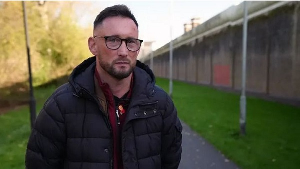Next to a vandalised wire fence opposite HMP Bronzefield in Surrey, 28-year-old Beatrice Auty brushes away tears. The memories of her time inside the jail are too much to bear.
She served more than a year here for money laundering, and claims she was sexually harassed by a male prison officer.
“He made me feel very uncomfortable,” Auty says. “He commented on my appearance - a lot. He suggested he wanted to come to my cell - I feel if I had been up for it, he would have wanted sexual favours.”
Auty says she reported what happened, and told us she’s spoken to other women who have had similar experiences with the same guard, who made “comments about their breasts” and “how he would want [oral sex] from them”.
With prisons across the country running out of cells and the government releasing offenders early to ease pressure, the BBC has been reporting on the issues facing a system on the brink of collapse.
There are 23,613 prison officers in England and Wales, looking after a prison population of 85,867 inmates.
A record 165 prison staff were sacked for misconduct in the year to June 2024, according to His Majesty’s Prison and Probation Service (HMPPS). That’s an increase of 34% on the previous year.
Some of the reasons for these dismissals include sex acts and other inappropriate behaviour with inmates, as well as selling drugs and phones - a lucrative trade inside prisons.
In 2023, Auty was convicted of smuggling millions of pounds of criminal cash from London to Dubai, and sentenced to 42 months in prison.
She served 14 months in HMP Bronzefield - the largest prison in Europe for female offenders - before being released on licence, meaning even though she’s been freed she must stick to a set of rules for the remainder of her sentence.
With her hands thrust firmly in her pockets, Auty describes how it was “not uncommon at all” to see prison staff in Bronzefield dealing.
“The drugs would often be transported on the food trollies and then distributed at the other end on the house blocks,” Auty says.
“On one hand you have a prison service that’s meant to be rule-abiding and strict and uphold British values, and in reality you have corrupt officers.”
In response to Auty’s claims, Sodexo, the private company that runs the prison, told the BBC it cannot comment on individual cases, but “where complaints are received about any employee, we undertake all appropriate investigations and take necessary actions as needed”.
Lee Davis was a prison officer from 2006 until 2010, during which time he regularly supplied cannabis, steroids and phones to inmates, getting paid £400-500 for every package he delivered.
After agreeing to take the first package, he describes a “snowball effect”.
“It then became two, and three," he says, "then after package four it was purely about the money.”
Davis was eventually caught and served two years in prison. He’s since turned his life around and works as a bus driver in Lancaster now, but says much more could be done to stop other prison staff dealing inside.
“They’ve got to up the ante by searching officers going in,” Davis says. “I was searched twice in three years and that isn’t good - we need to stop it at the gates.”
A prison officer who doesn't want to be identified who works in a different, government-run English jail, told us it's unsurprising to hear about staff corruption.
She says everyone working in prisons knows drugs are being supplied by officers.
“They know how to fiddle the system - they know better than anyone how to get drugs and phones in - because they know the checks they’ve got to go through," the woman says.
“Some [prison officers] are so young and inexperienced they easily get caught up in organised crime, with gangs inside sometimes putting pressure on them to supply all sorts.
“There’s a power dynamic, and prison officers can feel like they can do what they want - like asking for sex. They can make life difficult for those inside, and they know that.”
There have been several high profile cases this year which convey the problem of prison officer corruption.
Last month, former prison officer Richard Goss was jailed for four years after admitting to smuggling drugs, needles, and mobile phones into HMP Buckley Hall in Rochdale.
Another former officer, Linda De Sousa Abreu, was filmed having sex with an inmate in HMP Wandsworth in London. In July she was convicted of misconduct in a public office after the video went viral on social media.
Corruption inside prisons is now "a greater problem than it has ever been," according to John Podmore, a former governor of several large prisons, including HMP Belmarsh and HMP Brixton, both in London. He oversaw the prison service’s Corruption Prevention Unit and the London Prison’s Anti-corruption Team.
“There is a perfect storm of young inexperienced staff with poor vetting and inadequate training being thrown into a dystopian environment," Mr Podmore says, "where violence and organised crime dominate a failing prison system.”
He estimates the value of drugs traded across the prison estate each year is in excess of £1bn.
No specific qualifications are needed to become a prison officer in England and Wales.
On its website, HMPPS states new recruits will be given a 10-day induction, which includes finding out about prison life and being shown basic security processes.
This is followed by a seven-week training programme, during which trainees are taught how to look after people in custody and de-escalate challenging situations.
Mr Podmore describes this training as “totally inadequate”, and “the worst and shortest of any jurisdiction I have observed over five continents”.
“The vast majority of officers are corrupted as a result of conditioning, manipulation, coercion and blackmail, while being badly trained, poorly led and inadequately supervised,” he adds.
Steven Gillan from the Prison Officer Association told the BBC that, while he defends the vast majority of "hard working and professional" prison officers, he is "not going to sugar coat the issue of corruption” - one he describes as "very real".
“Prisons are complex places and there can be no place or excuse for corrupt staff,” he says.
The Ministry of Justice (MoJ) says it is “catching more of the small minority who break the rules. This includes by bolstering our Counter Corruption Unit and strengthening our vetting processes.
“Where officers do fall below our high standards, we will always take robust action.”
World News of Friday, 15 November 2024
Source: bbc.com



















